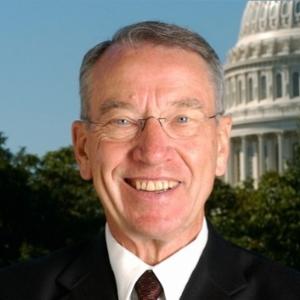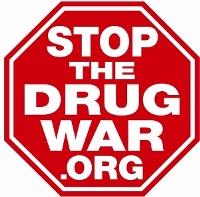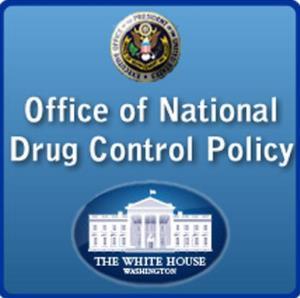The numbers are still horrifically high, but dropping fast, for a variety of reasons.
A bipartisan group of lawmakers has filed a marijuana legalization bill in Pennsylvania, the Mexican city of Culiacan is at a standstill amid fears of intra-cartel clashes, and more.
The White House has released its annual list of international drug war scofflaws, cartel faction violence continues in Sinaloa, and more.
The head of the Senate Drug Caucus files a bill targeting imported drug analogs, the toll rises from Sinaloa Cartel factional strife, and more.
A bill to reauthorize the drug czar's office has been filed, the Czech Republic is moving toward marijuana legalization, and more.
The Democratic candidate for governor in West Virginia says legalize marijuana, the Seattle city council approves neighborhood exclusion orders for drug offenders, and more.
The numbers are still horrifically high, but dropping fast, for a variety of reasons.

A ten percent decline in overdose deaths is good news, indeed, but there are still nearly 100,000 a year. (Creative Commons)
Fatal drug overdoses have declined dramatically, according to the latest data from the Centers for Disease Control and Prevention. (CDC). The
provisional drug overdose count for the 12-month period ending in April shows a ten percent decrease in overdose deaths. While overdose deaths appear to have plateaued in 2021-2022, they declined by three percent between 2022 and 2023, a decline that has only accelerated.
Drug overdose deaths, which had been on the increase during the century's first two decades, exceeded 100,000 per year by mid-2021 and peaked at more than 111,000 per year in the summer of 2023. But by April of this year, the toll had dropped to 97,309.
"This is exciting," said Dr. Nora Volkow, head of the National Institute On Drug Abuse [NIDA]. "This looks real. This looks very, very real," she told National Public Radio (NPR).
"The trends are definitely positive," said Dr. Keith Humphreys, a nationally respected drug policy researcher at Stanford University. "This is going to be the best year we've had since all of this started," he told NPR.
The CDC's provisional data did not include any breakdown by substance, but according to NIDA, in recent years, fentanyl and its derivatives have been implicated in between two-third and three-quarters of all overdose deaths, followed by cocaine and methamphetamine, which are each involved in about one-fifth of overdose deaths.
There could be even better news coming. Some researchers think that an even larger decline in overdose deaths will become evident once the provisional data is updated.
"In the states that have the most rapid data collection systems, we're seeing declines of 20 percent, 30 percent," said Dr. Nabarun Dasgupta, an expert on street drugs at the University of North Carolina. The decline could be saving "roughly 20,000 lives" per year, he told NPR.
Different factors are at play to account for the decline. Part of it is users simply growing familiar with fentanyl, part of it can be attributed to harm reduction measures such as the widespread access to the opioid overdose reversal drug naloxone. And part of it probably has to do with the ending of pandemic era isolation and social dislocation.
"Expansion of naloxone and medications for opioid use disorder -- these strategies worked," said Dr. Volkow at NIDA.
"We've almost tripled the amount of naloxone out in the community," said Brad Finegood, who directs the overdose crisis response in Seattle "A year ago when overdose deaths continued to rise, I was really struggling with hope," he told NPR. "Today, I have so much hope," Finegood said.
"This is the largest decrease on record and the fifth consecutive month of recorded decreases," said Dr. Rahul Gupta, head of the Office of National Drug Control Policy (ONDCP -- the drug czar's office), calling for more money treatment and health services in poor Black and Native American communities where overdose deaths remain high. "There is no way we're going to beat this epidemic by not focusing on communities that are often marginalized, underserved and communities of color," Gupta said told NPR.
Still, the decline in overdose deaths already has been striking -- especially in the eastern and central US. In Vermont, they are down 22 percent. In Ohio, they are down 31 percent. In Misssouri, 34 percent.
"While the mortality data for 2024 is incomplete and subject to change, Ohio is now in the ninth consecutive month of a historic and unexpected drop in overdose deaths," said Harm Reduction Ohio in a statement.
"A fifteen or twenty percent [drop in deaths] is a really big number, an enormous impact, said Dasgupta, calling for more research to determine how to keep the trend going. "If interventions are what's driving this decline, then let's double down on those interventions."
back to top

A peaceful scene in Culiacan, Sinaloa, Mexican. Things are not so peaceful these days. (Creative Commons)
Marijuana Policy
Pennsylvania Lawmakers File Bipartisan Marijuana Legalization Bill. Led by Reps. Aaron Kaufer (R) and Emily Kinkead (D), 17 lawmakers are cosponsoring a marijuana legalization bill that has been circulating in draft form in recent months, House Bill 2500. The bill got its formal rollout today.
Surrounded by legal marijuana states, Pennsylvania has lagged behind, and the bill sponsors said those states are positioned to "capture Pennsylvania dollars into their market."
The bill would legalize the possession of up to 30 grams by people 21 and over and allow medical marijuana patients -- but not adult-use consumers -- to grow up to five plants at home.
After two months of discussion, the original draft was altered to consolidate regulation of both medical and adult-use marijuana within the state Department of Agriculture. Social equity language in the draft has vanished, and it was amended to include strict limits on marijuana billboard advertising.
The original draft did not include any pathways for expungements, commutations, and resentencing for marijuana offenders; it now does. The original draft also allowed for up to three marijuana business licenses per operator; now that number is capped at one. There would be an eight percent sales tax and a five percent excise tax for marijuana products.
Medical Marijuana
Nebraska Medical Marijuana Initiatives Will Appear on November Ballot. Secretary of State Bob Evnen (R) certified a paired set of medical marijuana initiatives for the November ballot on Friday. The group behind the effort, Nebraskans for Medical Marijuana, went for the bifurcated approach to avoid constitutional challenges at the state Supreme Court that derailed earlier initiative efforts.
The first measure, the Nebraska Medical Cannabis Patient Protection initiative, would create a doctor-patient system for medical marijuana to protect patients from arrest. It would allow patients to possess up to five ounces of medicine.
The second measure, the Nebraska Medical Cannabis Regulation initiative, would create a framework for a regulated medical marijuana industry in the state. The plan envisions a commission to create rules and regulations for a commercial marketplace, with licensed businesses before October 1, 2025.
But while Evnen certified the measures for the ballot, he also said an ongoing investigation into signature gathering for the measures "has uncovered serious questions" and at least one signature gatherer has been charged with a felony.
"I am certifying the petitions because, at this point, they appear to have met the threshold signature requirements," Evnen said in a statement. "That could change in light of the Attorney General's investigation. Both cannabis petitions will appear on the ballot, but a court could order later that the initiatives be thrown out."
International
Japan Confirms Marijuana Use Will Be Punished By Up to Seven Years in Prison. The Health Ministry confirmed Thursday that it will indeed criminalize marijuana use as part of an overhaul of marijuana policy that includes expanding access to marijuana-derived medicinal products. Under the revised laws, people caught using marijuana face up to seven years in prison.
Under current law, possession and cultivation of marijuana is illegal, but use is not criminalized. Officials said the harsh stance was necessary to address rising drug use and serve as a deterrent. Japan is already notorious for its tough drug laws, but this takes that approach to a new level.
But while cracking down on non-medical marijuana use, the country is opening the door to medical marijuana products, especially marijuana-derived drugs. Patient groups have been lobbying hard for CBD medicines, which are already approved in large parts of the world.
Mexican City of Culiacan, Home of Sinaloa Cartel, at Standstill Amid Fears of Cartel Clashes. The state capital of Sinaloa, the western Mexican state that is home to the Sinaloa Cartel, was at a virtual standstill Thursday as residents and officials hunkered down amid clashes between rival factions of the drug trafficking organization. Businesses and schools in the city of a million inhabitants closed their doors and Mexican Independence Day festivities were canceled.
The Sinaloa cartel is on the verge of civil war after one of the sons of imprisoned cartel leader Joaquin "El Chapo" Guzman kidnapped remaining cartel leader Ismael "El Mayo" Zambada and delivered him to US authorities at a Texas airfield. "Los Chapitos" are now aligned against "Las Mayistas," provoking the deployment of military special forces, planes, and heavily armed helicopters, but factional clashes are continuing across the city, according to locals.
"The government doesn't control anything, absolutely nothing," said Ismael Bojórquez, director of the weekly newspaper Riodoce in Culiacan. "There is a lot of fear. The people are defenseless."
He said that cartel gunmen have clashes, kidnap victims, and burn vehicles, and then the government comes and takes away the burned vehicles -- no more. Faced with the local government's lack of action, residents are taking their own precautions, such as keeping their kids out of school.
Both Sinaloa Sinaloa Gov. Rubén Rocha and outgoing President Andres Manuel Lopez Obrador have downplayed the conflicts, saying that security forces are handling the situation. But even Rocha admitted that violence is continuing. Security forces are "dissuading some violent acts but above all reducing the risks to the population to a minimum," Rocha said. Still, for security reasons, "there will not be any celebration" for the September 15-16 independence holiday, he said, adding that school will be suspended Thursday and Friday because so few students showed up.
"There's obviously a fight for power" inside the cartel, Bojóquez said. "The only thing the government is doing is watching, observing the clash between the Chapitos and El Mayo's people," he said. "There's no action against the drug trafficking cells."
back to top
The White House has released its annual list of international drug war scofflaws, cartel faction violence continues in Sinaloa, and more.

Coca Nasa products. The company is suing Coca-Cola over trademark issues. (Coca Nasa)
Drug Policy
Biden Signs Bill to Study Financing of Illegal Synthetic Drugs. Last Friday, President Joe Biden (D) signed into law HR 1076, the "Preventing the Financing of Illegal Synthetic Drugs Act," which requires the Government Accountability Office to carry out a study on illicit financing in connection with the trafficking of synthetic drugs.
Introduced by Rep. Monica De La Cruz (R-TX), the bill sailed through both chambers of Congress, moving through various committees with nary a no vote and passing out of committees on unanimous consent motions.
The Congressional Research Service summary of the bill says it will require the GAO to "carry out a study on illicit financing in connection with the trafficking of synthetic drugs, including fentanyl and methamphetamine, fentanyl- and methamphetamine-related substances, Captagon, and fentanyl and methamphetamine precursors, and to report to Congress."
Foreign Policy
Biden Administration Designates Bolivia, Burma, Venezuela as Having Failed to Follow to US Drug Policies. In its annual Memorandum on the Presidential Determination on Major Drug Transit or Major Illicit Drug Producing Countries, the White House listed 23 countries as "major drug transit or major illicit drug producing countries (including countries that are a significant direct source of precursor chemicals used in the production of certain drugs and substances significantly affecting the United States)," but only named three of them -- Bolivia, Burma and Venezuela -- as "having failed demonstrably during the previous 12 months to both adhere to their obligations under international counternarcotics agreements and to take the measures required by section 489(a)(1) of the Foreign Assistance Act."
Notably, all three countries are political foes of the United States; Bolivia and Venezuela because of their leftist governments and Burma because of its brutal military dictatorship. While all three countries are involved in the illicit drug trade, their roles pale in comparison to countries that were not cited as "having failed demonstrably" to advance US drug policy objectives, such as Colombia and Mexico.
The countries named as major drug transit or illicit drug producing countries are Afghanistan, The Bahamas, Belize, Bolivia, Burma, the People's Republic of China (PRC), Colombia, Costa Rica, the Dominican Republic, Ecuador, El Salvador, Guatemala, Haiti, Honduras, India, Jamaica, Laos, Mexico, Nicaragua, Pakistan, Panama, Peru, and Venezuela.
Even though the administration names Bolivia, Burma, and Venezuela as drug war scofflaws, it is not barring any foreign assistance to those countries because "I have also determined, in accordance with provisions of section 706(3)(A) of the FRAA, that United States programs that support Bolivia, Burma, and Venezuela are vital to the national interests of the United States," Biden wrote in the memo.
International
Colombian Coca Company Challenges Coca-Cola's Trademark. Coca Nasa, a quarter-century old company making coca-based energy drinks, beers, and liquors is suing Coca-Cola to have its century-old trademark on the word "coca" removed. Coca Nasa says the effort is the result of repeated bullying by Coca-Cola over use of the term in Coca Nasa's products.
Coca Nasa says it is acting "in defense of the coca leaf" and that extending trademark protecting to Coca-Cola "the fundamental rights of Indigenous peoples." The mechanism has been used "abusively" by Coca- and should be rescinded.
Motivating the action, Coca Nasa says, is what it calls a history of Coca-Cola bullying smaller businesses into capitulating to its demands.
"This is as if David and Goliath were battling over colonialism," said David Curtidor, cofounder of Coca Nasa. "These business giants arrive thinking they're entitled to our cultural heritage and that they can then demand that we stop using it. What we're saying is: 'We've had enough.'"
Coca-Cola responded with the following brief statement: "The Coca-Cola Company respects all communities and their traditions as well as the laws and regulations of each country where it operates."
Curtido said he and his business partner founded the company "show the other face of coca and help it shed its dirty image." The 1961 Single Convention on Narcotic Drugs considers the plant a drug and requires the "uprooting of all coca bushes which grow wild" and bans the distribution of products with even trace amounts of the plant. But Coca-Cola operates through a loophole that allows leaves to be sold internationally if the cocaine alkaloid is distilled to make a "flavoring agent."
"And this is all incredibly ironic and hypocritical, because we've had our products banned and our cultural heritage destroyed while Coca-Cola has been allowed to continue selling without issues," Curtidor said.
To add insult to injury, Coca-Cola filed trademark infringement lawsuits against Coca Nasa in 2007 over its Coca Sek energy drink and again with the recent release of Coca Pola, "pola" being a Colombian slang term for beer. Coke demanded that Coca Nasa "cease and desist permanently from using the name Coca Pola or any similar term that could be confused with the commercial brands" it owned. Though Coca Pola rhymes with Coca-Cola, Curtidor insisted that it was just "the obvious way to name a beer made with coca." Coke said Coca Nasa had ten days to act.
"That's when we went, 'Actually, no. You are the one who has ten days to explain who gave you permission to use the coca plant and who gave you permission to use the name of a key element of our culture in your products,'" Curtido said. "We sent them a letter to that effect and, well, they never responded."
So, now Coca Nasa has asked Colombia's trademark agency to intervene. Stay tuned.
Mexico's Sinaloa Sees More Deaths in Cartel Faction Fights. At least 15 people have been killed in fighting between warring factions of the Sinaloa Cartel in the past week, including civilians. And that was before last Saturday when several more people were killed in the state.
The state public security department said Saturday that three civilians were killed in clashes between the army and "armed civilians" and that an additional "two homicides" were reported that day. A day earlier, five people were killed in the town of Concordia, which has been the scene of "violent events" between cartel factions.
The state and federal governments have sent security reinforcements to the capital city of Culiacan in an effort to quell the violence.
The clashes are fallout from the late July kidnapping of Sinaloa Cartel faction leader Ismael "El Mayo" Zambada and his delivery to US authorities by one of the sons of imprisoned cartel leader Joaquin "El Chapo" Guzman. Guzman's sons lead a rival faction, "los Chapitos."
The United States last Thursday issued a security alert because of "reports of car thefts, gunfire, security forces operations, roadblocks, burning vehicles, and closed roadways" in the vicinity of Culiacan.
back to top
The head of the Senate Drug Caucus files a bill targeting imported drug analogs, the toll rises from Sinaloa Cartel factional strife, and more.

Senate Chuck Grassley (R-IA) gives his anti-analogue legislation another shot. (senate.gov)
DEA Endorses New, Simplified Test to Determine Marijuana's Medical Uses Amid Rescheduling Debate. The Drug Enforcement Administration (DEA) has accepted the legitimacy of a new two-part test to determine whether a substance has accepted medical uses. That two-part analysis was used by the Department of Health and Human Services (DHS) when it made its recommendation to reschedule marijuana.
DEA has traditionally relied on a five-part test to establish whether a substance has "currently accepted medical use." That test required detailed examinations of the drug's chemistry, safety studies, efficacy, expert acceptance, and the availability of scientific evidence.
The new test focuses on two key questions: Do licensed healthcare providers use the substance for medical treatment in legally authorized jurisdictions and is there credible scientific support for a medical condition for which the substance is used?
The DEA has acknowledged that the Justice Department's Office of Legal Counsel (OLC) determined that the five-part test was "impermissibly narrow" and conceded that the two-part analysis was sufficient.
The DEA decision could have an impact beyond marijuana. It could also set a precedent for other drug scheduling decisions, such as those concerning psilocybin. The same new two-part test would be at play there, too.
Drug Policy
Sens. Grassley, Hassan Reintroduce SIMSA Act to Crack Down on Analogues. In a continuation of old-school prohibitionist efforts to repress the drug trade, Senate Drug Caucus Co-Chair Chuck Grassley (R-IA) and caucus member Maggie Hassan (D-DH) on Tuesday led bipartisan colleagues in reintroducing the Stop Importation and Manufacturing of Synthetic Analogues (SIMSA) Act The legislation targets deadly drugs that are substantially similar to already-controlled substances but carefully engineered -- often in China or Mexico -- to slip into the US undetected.
"International drug traffickers are taking advantage of a gap in our laws. This has created a lethal game of 'whack-a-mole.' The SIMSA Act sends an explicit message the US is done playing," Grassley said. "Law enforcement is struggling to keep pace under the inefficient scheduling system we have, and communities are dealing with an unprecedented drug crisis as a result. Our legislation provides much-needed adaptability to get ahead of bad actors and their deadly synthetics."
US law prohibits the unauthorized use of certain controlled substances. However, illicit drug makers and importers circumvent those laws by altering single atoms in controlled substances to create tweaked drugs that are not yet outlawed but have similar effects on users. Currently, uncontrolled substances must undergo a time-consuming analysis before the Drug Enforcement Administration (DEA) can permanently schedule them.
According to a press release from Grassley, the SIMSA Act allows DEA to assign substances as Schedule A if (1) their chemical structure is substantially similar to a controlled substance and (2) they are expected to have the same or greater effect on the human body. The bill subjects individuals who manufacture, export, and import these uncontrolled substances to the criminal penalties associated with Schedule I. It also includes provisions to ensure legitimate research on substances added to Schedule I can continue.
Grassley introduced similar legislation to no avail in 2019 and 2021.
International
Four Arrested in Bali Over Drugs Face Death Penalty. The Indonesian anti-drug chief said Tuesday that four people recently arrested on drug charges on the island of Bali will face the death penalty. They include two Indonesians and two Thai nationals arrested at the Bali airport earlier this month with methamphetamine.
"The drugs would be handed over to two Indonesians who ordered it," said Bali narcotics agency head Rudy Ahmad Sudrajat.
Sudrajat also announced the arrests of two Europeans in July, a Latvian man facing up to 20 years in prison for a pound of hash and two pounds of marijuana and a Swede caught with half a pound of hash who faces 15 years.
Indonesia has some of the world's toughest drug laws. Although it has not executed anyone since 2016 -- when it subjected four drug traffickers to the firing squad -- there are dozens of drug offenders on the country's death row, including a British grandmother caught smuggling cocaine and a Filipino woman caught smuggling heroin.
Mexico Sinaloa Cartel Factional Fight Toll Keeps Climbing. The death toll from continuing clashes between rival factions of the Sinaloa Cartel has risen to 30 after 11 more people were killed in a wave of violence over the weekend, state authorities said Sunday.
That figure includes five men whose bodies were found south of Culiacan, the state capital. That brings the toll to 30 reported dead in a week of clashes across the city and the state.
The infighting is linked to the July kidnapping and delivery to US authorities of cartel leader Ismael "El Mayo" Zambada by Joaquin Guzman Lopez, one of the sons of imprisoned cartel leader Joaquin "El Chapo" Guzman and a leader of the rival "Los Chapitos" cartel faction. The young Guzman also turned himself in to US authorities along with Zambada, undoubtedly in hopes of negotiating favorable treatment for himself and his father in return for giving up Zambada.
The State Department last Thursday issued a security alert for the state because of "reports of car thefts, gunfire, security forces operations, roadblocks, burning vehicles and closed roadways" in the vicinity of Culiacan.
back to top
A bill to reauthorize the drug czar's office has been filed, the Czech Republic is moving toward marijuana legalization, and more.
Marijuana PolicySenate Committee Approves DOOBIE Act to Prevent Agencies from Denying Jobs over Past Marijuana Use. The Senate Homeland Security and Governmental Affairs Committee voted Wednesday to approve a bill that would limit the ability of federal agencies to use past marijuana use as a factor in employment and security clearance decisions The bill is the cutely-acronymed Dismantling Outdated Obstacles and Barriers to Individual Employment (DOOBIE) Act (S. 4111).
Sponsored by committee chair Sen. Gary Peters (D-MI), the bill is the latest effort to ensure that people seeking federal employment are not penalized because they used marijuana. It says that the agencies covered "may not base a suitability determination with respect to an individual solely on the past use of marijuana by the individual."
"The federal government must adapt its hiring practices to reflect the evolving legal and social landscape of our nation," Peters said. "My bill takes a crucial step by aligning federal policy with existing agency guidance, ensuring that past marijuana use alone doesn't automatically disqualify talented individuals from public service. This approach will expand our talent pool and create a fairer, more inclusive hiring process."
The bill would also require similar policies at the White House Office of Personnel Management and from the Director of National Intelligence. It now awaits a Senate floor vote.
Medical Marijuana
Arkansas Poll Has Medical Marijuana Expansion Initiative Winning. A new poll from Talk Business & Politics-Hendrix College has the Issue 3 medical marijuana amendment winning on Election Day. The poll has the initiative winning with 54 percent of the vote, compared to 35.5 percent opposed, and 10.5 undecided -- suggesting that even if all the current undecideds ended up voting against no, it would still win.
The amendment would expand the state's existing medical marijuana program by allowing patients to grow their own plants at home and allow doctors to recommend it for any medical condition they think it could benefit. It would also allow for reciprocity with other medical marijuana states.
The poll comes about two weeks after Arkansans for Patient Access turned in a final batch of signatures after coming up short in the initial round of petitioning. That allowed them to qualify for the November ballot.
Issue 3 "is something of a referendum on the general concept of medical marijuana in place since a 2016 vote by the people," said Jay Barth, emeritus professor of politics at Hendrix College. "A majority of the respondents in our survey do express support for Issue 3, suggesting a well-funded campaign will be necessary to change the outcome," he said. "Medical marijuana expansion is particularly popular among the state's younger voters, among those with college degrees, among voters of color, and among voters who live in urban/suburban areas. Ratification of Issue 3 would, it seems, move Arkansas voters one step closer to full legalization of recreational marijuana in the state," he said.
Drug Policy
Comer and Raskin Introduce Bipartisan Bill to Reauthorize the Office of National Drug Control Policy. House Committee on Oversight and Accountability Chairman James Comer (R-KY) and Ranking Member Jamie Raskin (D-MD) introduced the Office of National Drug Control Policy (ONDCP) Reauthorization Act of 2024 (HR 9598) "to reauthorize the ONDCP and related programs and ensure federal agencies are properly resourced to hold accountable those who are trafficking drugs into the United States at the southwest border," they said in a press release Wednesday.
"The Office of National Drug Control Policy is a key player in the fight against the fentanyl and drug crisis ravaging communities across the United States. This bipartisan bill will hand the ONDCP the necessary tools to combat the drug epidemic and help ensure federal agencies tasked with securing the border and prosecuting drug trafficking are using their resources effectively to prevent illicit drugs from pouring across the southwest border," said Comer.
"This bipartisan bill authorizes critical funding to the federal agencies that are working to end the opioid epidemic. From providing assistance to federal, state, local, and tribal law enforcement agencies to improving the tools available for opioid treatment and recovery, Congress is stepping up in our efforts to get federal dollars to the American people," said Raskin.
The bill reauthorizes the Reauthorizes the High Intensity Drug Trafficking Areas (HIDTA) program and the Drug-Free Communities (DFC) program at FY 2024 enacted funding levels through FY 2031 and similarly reauthorizes related ONDCP programs including the Drug Court Training and Technical Assistance program, the Model Acts Program, the Community-Based Coalition Enhancement Grants program, and the National Community Anti-Drug Coalition Institute.
It also "codifies the Caribbean Counter Narcotics Strategy" to address drug trafficking in the Caribbean, and requires the director of ONDCP to conduct a study on life-saving opioid overdose reversals.
International
Czech Republic Ponders Marijuana Legalization Models. The legislature is considering moving from marijuana decriminalization to some form of legalization, and former drug policy coordinator Jindrich Voboril has proposed two models: one of full commercial legalization and one echoing Germany's approach of home cultivation and cannabis co-ops without retail sales.
The University of Economics in Prague has examined four models of marijuana regulation: maintaining the decriminalization status quo, legalizing home cultivation only, legalizing home cultivation and cannabis clubs, and full commercial legalization.
The university found that the black market would continue to be a serious problem under the first three models. Under commercial legalization, though, marijuana could generate revenues of $41 billion a year while diminishing the black market. The push for legalization is being led by the Rational Regulation Association, which has been running an "It's OK" campaign to educate the public and lawmakers about legalization and support people suffering under restrictive drug laws.
back to top
The Democratic candidate for governor in West Virginia says legalize marijuana, the Seattle city council approves neighborhood exclusion orders for drug offenders, and more.

Drug overdose deaths declined by more than 10% in the past year. (Pixabay)
Idaho Activists File Marijuana Legalization Initiative for 2026. A group of activists known as Kind Idaho have filed a marijuana legalization initiative with state officials, aiming at the 2026 ballot.
"We are pursuing personal use and home cultivation decriminalization," Kind Idaho said Tuesday. Under the proposal, the group said, adults do not need to "register for a card, get a license to personal grow, go to a doctor to renew your prescription, and you get to choose what works best for you. You should not need permission from the state for basic self-care. "You shouldn't get in trouble over a plant."
The same group twice tried unsuccessfully to get medical marijuana on the ballot in 2022 and this year. This legalization initiative does not have any provisions for legal marijuana commerce, but instead exempts marijuana "possession, production, or cultivation" from state drug laws provided that the cannabis is for personal use, is not consumed "in any public or open setting" and is not possessed by anyone under 21.
"Nothing in this section shall be construed to allow private or commercial sale or resale of any controlled substance," it specifies, "nor transportation in quantities that exceed one ounce of plant or 1,000 mg of THC in other Marijuana derived or infused products."
To qualify for the 2026 ballot, the group needs to come up with the signatures of at least six percent of the voters who voted in the last general election. For the latest election, that figure was 62,985 signatures.
West Virginia Democratic Gubernatorial Candidate Calls for Marijuana Legalization. Huntington Mayor Steve Williams, the Democratic candidate for state governor of West Virginia, has come out in support of legalizing marijuana. The state currently allows only medical marijuana.
"West Virginia has an opportunity to join the growing number of states, including Maryland, Ohio, Virginia, and Washington, DC, that have taken bold steps to legalize cannabis, and I believe it’s time we give the people a voice on this issue," Williams said. "One avenue to move forward is to put legalization on the ballot and let voters decide."
Under state law, voters could approve legalization through a statewide constitutional amendment, but that public vote would have then be approved by the state legislature.
Williams said marijuana tax revenues could fund education, health care, and infrastructure and drive new economic growth.
"We can look to states like Colorado and California, where cannabis legalization has spurred economic growth and created thousands of jobs," Williams said. "West Virginia can follow their lead to diversify our economy and attract new opportunities."
His opponent, Republican Attorney General Patrick Morrisey, said legalizing another drug is not the answer to the state’s substance use disorder crisis. Morrisey was leading Williams by a substantial margin in a poll last month.
Drug Policy
Drug Overdose Deaths Drop Dramatically. According to the latest data from the Centers for Disease Control and Prevention (CDC), drug overdose deaths have declined a dramatic 10.6 percent in the 12-month period ending in April of this year. This is after years of increases in the overdose death toll, which reached a level of more than 100,000 a year beginning in 2021.
The decline could be even more dramatic.
"In the states that have the most rapid data collection systems, we're seeing declines of twenty percent, thirty percent," said Dr. Nabarun Dasgupta, an expert on street drugs at the University of North Carolina. Dasgupta also found steep declines in emergency room visits linked to overdoses.
"Some of us have learned to deal with the overdoses a lot better," said Kevin Donaldson, who uses fentanyl and xylazine on the street in Burlington, Vermont.
He said many users now carry naloxone and that fellow users take drugs with others nearby as a safety precaution.
In Vermont, data shows a 22 percent decline in overdose deaths this year.
"The trends are definitely positive," said Dr. Keith Humphreys, a nationally respected drug policy researcher at Stanford University. "This is going to be the best year we've had since all of this started."
Seattle City Council Approves "Stay Out of Drug Areas" Ordinance. The city council on Tuesday approved a controversial ordinance creating Stay Out of Drug Areas (SODA) aimed at cracking down on public drug use and sales. The ordinance allows judges to bar people accused of drug crimes from entering SODAs in the city core. It passed 8-1.
Critics of the measure say it will only harm vulnerable people and push the problems into new neighborhoods.
Under the SODA law, municipal court judges will be able to issue SODA zone exclusion orders to people convicted of drug possession, or charged with or convicted of assault, harassment, theft, criminal trespass, property destruction, or unlawful use or possession of weapons if the judge finds a link between that offense and illegal drug activity. City judges can't impose SODA orders on people convicted of drug trafficking because that is a felony and under the jurisdiction of the King County Prosecutor.
Violation of a SODA order would be a gross misdemeanor, punishable by a maximum of 364 days in jail and/or a fine of up to $5,000.
(This article was prepared by StoptheDrugWar.org's 501(c)(4) lobbying nonprofit, the Drug Reform Coordination Network, which also pays the cost of maintaining this website. DRCNet Foundation takes no positions on candidates for public office, in compliance with section 501(c)(3) of the Internal Revenue Code and does not pay for reporting that could be interpreted or misinterpreted as doing so.)
back to top






